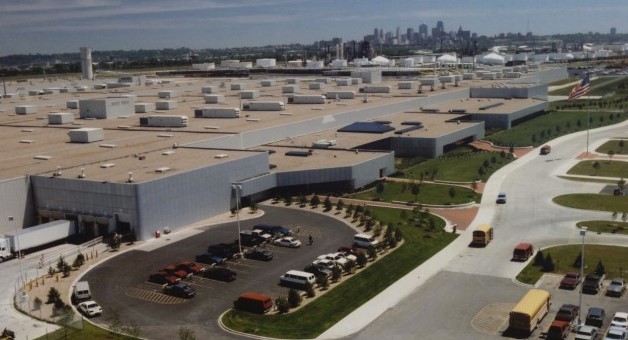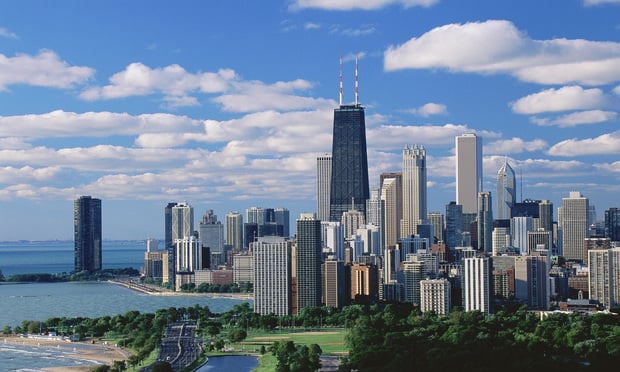
KANSAS CITY—Few industries got slammed harder during the recession than automobile manufacturing, and its near downfall cut deep into the economy of several Midwest metro areas. But the sector's revival did not just return employment levels in these regions to where they were in 2006. The big auto firms have poured billions into refurbishing aging plants, expanded production, and attracted a host of new auto suppliers, many of whom needed land and new facilities, both for production and distribution.
That revival has changed the industrial landscape of Kansas City.
“We saw a lot of tightening in 2009,” Ashlie Hand, vice president of the Kansas City Area Development Council, tells GlobeSt.com. Due to the diverse nature of the regional economy, “we did not necessarily see as big a drawdown as other areas, but it's taken a long time to bounce back.”
“It was in 2012 that the auto industry started to surge,” she adds. “General Motors and Ford began reinvesting in their Kansas City plants and it has ballooned from there.”
In January 2013, GM announced that it would spend $600 million to upgrade its Fairfax Assembly Plant in Kansas City, KS, where it builds the Chevrolet Malibu. A few months later, Ford announced that it would add 2,000 workers to its Kansas City Assembly Plant to meet consumer demand for the Ford F-150 and produce the new Ford Transit.
“The Transit has been transformational,” says Hand. And these moves have “brought some stability to the existing workforce, and brought a lot of new jobs into the region,” giving Kansas City even more credibility as a manufacturing center.
Grupo Antolin, the largest auto parts supplier in the world, recently built an $18 million, 148,000-square-foot plant in Kansas City in response to the growing needs of the US car companies. The firm now employs about 300 people in the metro region.
And Antolin was just one of about a dozen suppliers to recently establish new operations here. Martinrea International, one of the largest global Tier 1 auto-parts suppliers, signed a long-term, build-to-suit lease for a 275,560-square-foot building in suburban Riverside's Horizons Business Park.
Furthermore, Auburn Hills, MI-based US Farathane evaluated sites in five states before selecting a 220,000 square foot spec building in Horizons Business Park. The company will hire hundreds of people by 2018 and invest $51.6 million in the project. It plans to manufacture injection moldings primarily for the GM plant and also use Kansas City as a central hub for certain product lines.
Other players in the region have also responded to Kansas City's growth. Rail companies, for example, have built huge intermodal facilities like BNSF's at Logistics Park Kansas City. And Hand says the local community colleges have done their part by adding new training courses that prepare workers for the jobs created by GM, Ford, and their suppliers.
And the growing popularity of Ford's Transit and the F-150, as well as GM's Chevy Malibu, bodes well for the region's future. “Manufacturers are appealing, both as large employers and as users of large amounts of space,” says Hand. “And manufacturers have found a well-trained and well-educated workforce in Kansas City.

KANSAS CITY—Few industries got slammed harder during the recession than automobile manufacturing, and its near downfall cut deep into the economy of several Midwest metro areas. But the sector's revival did not just return employment levels in these regions to where they were in 2006. The big auto firms have poured billions into refurbishing aging plants, expanded production, and attracted a host of new auto suppliers, many of whom needed land and new facilities, both for production and distribution.
That revival has changed the industrial landscape of Kansas City.
“We saw a lot of tightening in 2009,” Ashlie Hand, vice president of the Kansas City Area Development Council, tells GlobeSt.com. Due to the diverse nature of the regional economy, “we did not necessarily see as big a drawdown as other areas, but it's taken a long time to bounce back.”
“It was in 2012 that the auto industry started to surge,” she adds. “
In January 2013, GM announced that it would spend $600 million to upgrade its Fairfax Assembly Plant in Kansas City, KS, where it builds the Chevrolet Malibu. A few months later, Ford announced that it would add 2,000 workers to its Kansas City Assembly Plant to meet consumer demand for the Ford F-150 and produce the new Ford Transit.
“The Transit has been transformational,” says Hand. And these moves have “brought some stability to the existing workforce, and brought a lot of new jobs into the region,” giving Kansas City even more credibility as a manufacturing center.
Grupo Antolin, the largest auto parts supplier in the world, recently built an $18 million, 148,000-square-foot plant in Kansas City in response to the growing needs of the US car companies. The firm now employs about 300 people in the metro region.
And Antolin was just one of about a dozen suppliers to recently establish new operations here. Martinrea International, one of the largest global Tier 1 auto-parts suppliers, signed a long-term, build-to-suit lease for a 275,560-square-foot building in suburban Riverside's Horizons Business Park.
Furthermore, Auburn Hills, MI-based US Farathane evaluated sites in five states before selecting a 220,000 square foot spec building in Horizons Business Park. The company will hire hundreds of people by 2018 and invest $51.6 million in the project. It plans to manufacture injection moldings primarily for the GM plant and also use Kansas City as a central hub for certain product lines.
Other players in the region have also responded to Kansas City's growth. Rail companies, for example, have built huge intermodal facilities like BNSF's at Logistics Park Kansas City. And Hand says the local community colleges have done their part by adding new training courses that prepare workers for the jobs created by GM, Ford, and their suppliers.
And the growing popularity of Ford's Transit and the F-150, as well as GM's Chevy Malibu, bodes well for the region's future. “Manufacturers are appealing, both as large employers and as users of large amounts of space,” says Hand. “And manufacturers have found a well-trained and well-educated workforce in Kansas City.
Want to continue reading?
Become a Free ALM Digital Reader.
Once you are an ALM Digital Member, you’ll receive:
- Breaking commercial real estate news and analysis, on-site and via our newsletters and custom alerts
- Educational webcasts, white papers, and ebooks from industry thought leaders
- Critical coverage of the property casualty insurance and financial advisory markets on our other ALM sites, PropertyCasualty360 and ThinkAdvisor
Already have an account? Sign In Now
*May exclude premium content© 2025 ALM Global, LLC, All Rights Reserved. Request academic re-use from www.copyright.com. All other uses, submit a request to [email protected]. For more information visit Asset & Logo Licensing.








